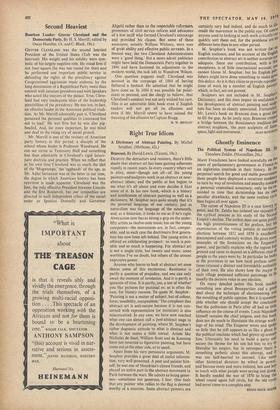Ghostly Eminence
The Political System of Napoleon III. BY Theodore Zeldin. (Macmillan, 24s.) peculiar drawbacks, and the same restless Yele a personal centralised autocracy; only to be -re' minded in time that dictatorship has its ovi9 years of parliamentary government in France 99 an inglorious interlude in their. history. In the perpetual search for good and stable governr °tit these people have displayed a recurrent tendlnc to turn by way of 'revolution and anarchy towards MANY Frenchmen have looked scornfully or the
Y then begins all over again. -
The career of Napoleon III is a case history point, and Dr. Zeldin has isolated one moment the cyclical process in his study of the Second Empire's decline. The author does not quite ju! tifr the high pretentiousness of his preface, but Ills examination of the voting pattern itr successive , elections between 1852 and 1870 is excellentlY documented and concisely written. He gives marl examples of the limitations on the Emperor's power, and partially explains why the regime lost
of
ground and came to depend on a different clas people as the years went by. In particular he lc oks at the provinces to see how local prefects some' times retained a distinct and formidable authcritY of their own. He also shows how the mayor each village possessed sufficient patronage to iisually the decisive voice in any election. On many detailed points this book teaches something new about Bonapartism and a go°d deal about the technique of electioneering anti the moulding of public opinion. But it is quest on- able whether one should accept the conclu: lott that the politicians in Paris after all had so 1 tde influence on the course of events. Louis Napoleon himself remains the chief enigma, and this book does not do much to illuminate the strange svc ings of his mind. The Emperor wrote and spolte so little that he still appears to us like a ghost in the political machine which had grown up around him. Ultimately his need to build a party nd secure the throne for his son led him to try tO liberalise his empire, but in retrospect there something something pathetic about this attempt, and lt was too half-hearted to succeed. Like scrne other historical dictators he wilted in power, and became more and more isolated, less and 1e55 in touch with what people were saying and doing. It hardly needed the war of 1870 to bring the wheel round again full circle, for the old cydC had never come to a complete stop. TO
DENIS MACK SM


































 Previous page
Previous page